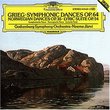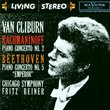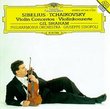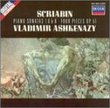| All Artists: Wolfgang Amadeus Mozart, Nikolaus Harnoncourt, Concentus Musicus Wien, Barbara Bonney, Uwe Heilmann, Gilles Cachemaille, Elisabeth von Magnus Title: Mozart: Missa Solemnis K. 337 ¿ Litaniae K. 125 ¿ Regina Coeli K. 276 Members Wishing: 0 Total Copies: 0 Label: Warner Music France Release Date: 5/11/1993 Album Type: Import Genre: Classical Styles: Opera & Classical Vocal, Historical Periods, Classical (c.1770-1830) Number of Discs: 1 SwapaCD Credits: 1 UPC: 745099049423 |
Search - Wolfgang Amadeus Mozart, Nikolaus Harnoncourt, Concentus Musicus Wien :: Mozart: Missa Solemnis K. 337 ¿ Litaniae K. 125 ¿ Regina Coeli K. 276
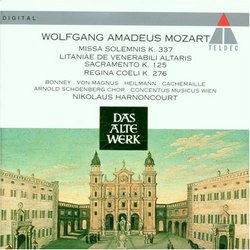 | Wolfgang Amadeus Mozart, Nikolaus Harnoncourt, Concentus Musicus Wien Mozart: Missa Solemnis K. 337 ¿ Litaniae K. 125 ¿ Regina Coeli K. 276 Genre: Classical
|
Larger Image |
CD DetailsSimilarly Requested CDs
|
CD ReviewsLovely Lesser-Known Mozart 05/15/2003 (5 out of 5 stars) "Less admired and popular than the Coronation Mass and Great C Minor Mass, Mozart's Missa Solemnis K 337 should actually be called a missa brevis, whose compact form, for example, dispatches the usually lengthy business of the Credo in a mere five minutes. Though diminutive, K 337 is a festive work not terribly dissimilar to the Coronation Mass, though lacking its uncanny melodiousness. Still, the Missa Solemnis is a fine piece deserving of more attention than it seems to get in the concert hall and on disc. If anything, I enjoy the early Litaniae K 125 even more. A tender work, with some lovely and elaborate music for the solo voices, it is one of those pieces that shows Mozart, musically at least, was more at home in the opera house than in the cathedral. Still, K 125 is a gracious piece of music worth getting to know.The seven-minute Regina Coeli is an Eastertide composition, lively and properly celebratory in nature--a happy addendum.While Harnoncourt is sometimes berated for his eccentric and wayward style in baroque and classical choral music, I have nothing but praise for his conducting on this disc. He doesn't dawdle over felicities but keeps the music going in fine classical style, with the result that these compositions never become precious, as they might. And his well-drilled orchestra and chorus abet him ably at every turn. What a joy to hear the period brass cutting through the textures with such force and color, especially the trombones, who disappear from this sort of music when modern orchestras attempt it. Harnoncourt's soloists are distinguished indeed, and Barbara Bonney is a standout. She handles Mozart's coloratura writing with great aplumb, as well as downright beautiful tones. Excellent sound from Teldec too. This one's a winner." More Terrific Early Mozart Liturgical Music B. Marold | Bethlehem, PA United States | 08/17/2006 (5 out of 5 stars) "Two CD's of Mozart's masses on Teldec directed by Nikolaus Haroncourt, with the Arnold Schoenberg Choir and the Concentus Musicus Wien (Vienna) are two delightful samples of Mozart's genius applied to liturgical music. Both sets of works were written while Mozart was still in the employ of the Archbishop of Salzburg (a political rival to Emperor Joseph, as seen in the early scenes of Peter Schaffer's play `Amadeus').
These liturgical works bring two things to mind. First, and easier, is the observation that virtually all of these works are musically more interesting than the famous unfinished `Requiem Mass' finished and performed postmortem, and the center of one of the great mysteries surrounding Mozart's life. After listening to it for years, I've finally come to the conclusion that it's majesty is due at least as much to the fact that it is performed in a cathedral by large professional choirs, than to any musical genius. In the same circumstances, the `Happy Birthday' song would sound grand. These earlier liturgical works seem to have much more genuine musical interest. The second question which comes to mind is why we, or more properly, organized religion and its patrons, are constantly underwriting new musical settings for worship. One is far less surprised by modern `folk' masses when one realized that Mozart was putting Catholic liturgy in the mouths of Neapolitan opera soloists, with matching orchestral accompaniment. Not that I'm complaining. I only envy the Catholics their monopoly on the world's greatest music in praise of God, while we Lutherans are left with hymns which are constrained by what can be handled by an amateur choir and parishioners who are novices at reading music. One of the most satisfying aspects of these works is their brevity. If one had the ambition to underwrite the performance of a classical Mass, these are much easier to handle than Mozart's `Requiem', let alone Bach's epic `Mass in B-Minor'. They almost make one nostalgic for the old Latin service, almost! " |

 Track Listings (16) - Disc #1
Track Listings (16) - Disc #1